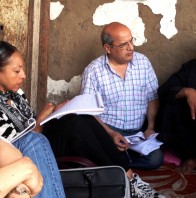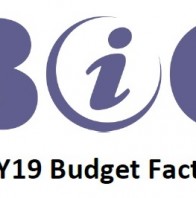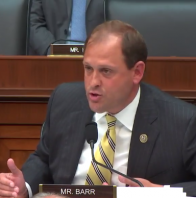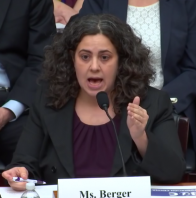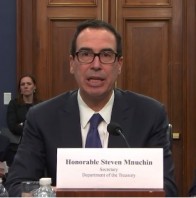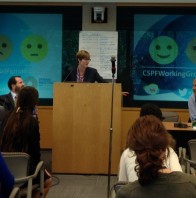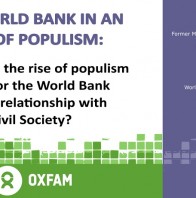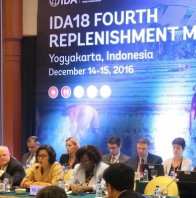BIC works with partners to advocate for transparency, accountability, and inclusiveness in international development policy, particularly the international financial institutions (IFIs). Our Policy Blog provides updates on our work engaging development policy issues.
Community discussion on a World Bank Inspection Panel case in Egypt Last week, Senate Appropriators sent a strong message to the World Bank in support of the institution’s Independent Accountability Mechanisms (IAMs). The FY19 State & Foreign Operations Appropriations bill that was approved by the Appropriations Committee not only recommends fully funding the U.S. contribution to IDA18, which supports the world’s poorest countries, it also allocates an additional $2 million for the World Bank Group’s IAMs that are responsible for holding the institution accountable when its projects result in harm. The World Bank …
The Spring Meetings[*] of the World Bank Group and International Monetary Fund do not just serve as an opportunity for central bankers, finance ministers, and private sector executives to discuss the global economy and their new, innovative ideas for ending poverty. The Bank and Fund also host dozens of events to discuss global development issues with journalists, development experts, and academics. Hundreds of civil society representatives from around the world will also descend upon Washington D.C. next week to take part in the Civil Society Policy Forum (CSPF),[†] a side event …
FY18 Omnibus: IFI Contributions The FY18 Omnibus included nearly $1.5 billion in funding for the IFIs. At a time when the U.S. commitment to multilateralism is in question, this spending bill suggests that using the multilateral development banks to reach the world’s poorest countries remains a priority for now. Over the last year, the U.S. contribution to the International Development Association (IDA)—the World Bank’s fund for the poorest countries—was the subject of debate both within the administration, which cut the most recent U.S. pledge to IDA, as well as in Congress …
The Trump Administration’s FY19 budget was released this week. While some foreign assistance accounts saw proposals for deeper cuts, the budget largely calls for maintaining the cuts that the administration called for in in its first budget request last year–including those for the multilateral development banks (MDBs) such as the World Bank. More information on specific MDB accounts can be found here: FY19 Budget Fact Sheet
The House Financial Services Committee passed the World Bank Accountability Act of 2017 today, authorizing U.S. participation in IDA, the World Bank’s fund for the poorest countries. The bill funds IDA at the level recently requested by the Trump administration, but conditions that funding on whether the Bank adopts certain reforms, which the bill’s sponsor, Rep. Andy Barr (R-KY) called “long overdue.” The first set of conditions in the bill would allow the U.S. to withhold 15% of its annual contribution if the Bank fails to adopt institutional reforms related to …
On March 22, BIC’s Elana Berger testified before the House Financial Services Committee subcommittee on Monetary Policy and Trade. Berger’s testimony at the hearing entitled “Examining Results and Accountability at the World Bank,” focused on the impacts of the Uganda Transport Sector Development Project (TSDP) and the significant internal reforms at the Bank resulting from it. As is often the case with large infrastructure projects, TSDP led to a large influx of construction workers to an isolated, rural community in Western Uganda. Teenage girls subsequently experienced sexual harassment, exploitation, and rape. …
Yesterday, Secretary Mnuchin made his first trip to the Hill to defend the White House budget request for Treasury’s international programs. The World Bank was a key focus of the hearing, in which lawmakers questioned how cuts to IDA—the World Bank’s arm for the poorest countries—could have significant implications for America’s leadership position on the international stage as well as its national security. The main takeaways from the hearing include: Lawmakers on both sides of the aisle are skeptical that cuts to foreign assistance, including the U.S. commitment to IDA, support …
Last week, BIC and Oxfam co-hosted a high level panel alongside the World Bank/IMF Spring Meetings aimed at confronting one of the biggest changes in the power dynamics surrounding the World Bank since its founding: the rise of populism. “The World Bank in an Age of Populism” featured distinguished speakers—Caroline Anstey, Ray Offenheiser, Alex Their, Masood Ahmed, and Shawn Donnan—debating the causes of populism and its implications for development. The panelists responded to questions intended for quick, deep dives into some of hottest topics at this year’s Spring Meetings for IFI …
The rise of populist movements in many of the World Bank’s member countries poses new challenges for a Bank that is accountable to its Board. This session will put this year’s Spring Meetings in the context of one of the biggest changes in the power dynamics surrounding the World Bank since its founding. Join us for a discussion about the challenge that populist governments pose to international organizations like the World Bank, and how the World Bank and civil society can work together to promote shared objectives in this new environment.
After several months of negotiations, and the announcement of a record $75 billion replenishment for the World Bank’s fund for the poorest countries, the final IDA18 replenishment report was publicly released in late January, 2017. The agreement to fund the World Bank’s soft-loan window comes at an uncertain time for development aid in the United States, with President Trump proposing to slash foreign aid assistance, and completely cut foreign climate change programs. Nevertheless, the IDA18 agreement is an ambitious proposal that is an important step forward for the Bank in how …

